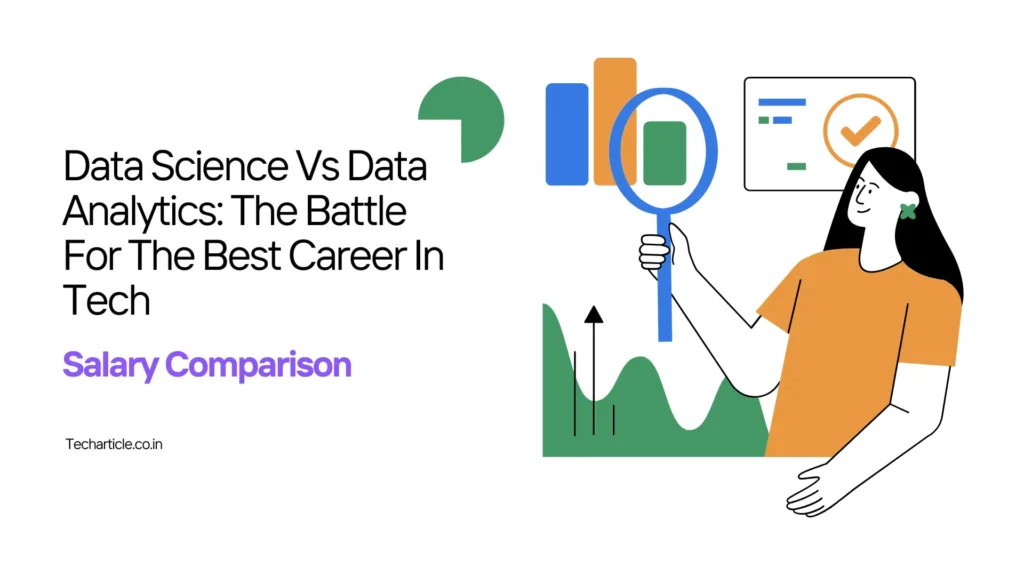
Data drives decisions in today’s world. Businesses rely on it to grow. However, many people confuse data science vs data analytics. Although both deal with data, their goals differ.
Data science predicts future trends using complex models. On the other hand, data analytics interprets past data for insights. This article explains their differences, required skills, and career paths. By the end, you’ll know which path suits you best.
What is Data Science?
Data science extracts insights from structured and unstructured data. It uses advanced algorithms, machine learning (ML), and artificial intelligence (AI). Moreover, it focuses on predictive modelling and big data processing.
For example, Netflix uses data science for recommendations. Banks use it to detect fraud. Additionally, self-driving cars rely on data science for decision-making. It’s a high-complexity field requiring strong programming and math skills.
What is Data Analytics?
Data analytics examines historical data to find trends. It helps businesses make informed decisions. Furthermore, it focuses on descriptive analytics and reporting. Tools like SQL, Excel, and Tableau are commonly used.
For instance, a retailer may analyse sales data to improve stock levels. A marketing team might study customer behaviour to refine campaigns. Unlike data science, it doesn’t involve heavy coding or AI. Instead, it emphasises clear visualisations and business insights.
Key Differences Between Data Science and Data Analytics
While both data science vs data analytics work with data, their approaches and outcomes differ significantly. Let’s break it down further:
Objective
- Data Science focuses on predictive modelling and AI-driven solutions. It answers questions like “What could happen next?” using machine learning. For instance, it powers Netflix’s recommendation engine or Tesla’s autonomous driving.
- Data Analytics examines historical data to find trends. It answers “What happened and why?” For example, it helps Amazon analyse last year’s sales to plan inventory.
Tools Used
- Data Science relies on programming languages like Python and R for building models. Frameworks like TensorFlow and PyTorch are used for deep learning. Big data tools like Hadoop and Spark process massive datasets.
- Data Analytics uses SQL to query databases and Excel for quick analysis. Visualization tools like Tableau and Power BI turn raw data into easy-to-understand dashboards.
Complexity
- Data Science involves advanced mathematics (linear algebra, calculus) and complex algorithms. Professionals often need a strong background in computer science or statistics.
- Data Analytics requires statistical knowledge and business acumen. While coding helps, many analysts work with drag-and-drop tools like Tableau without deep programming.
Output
- Data Science produces AI models, automation scripts, and predictive systems. For example, a fraud detection model in banking.
- Data Analytics delivers reports, KPIs, and visual dashboards. A marketing team might use these to track campaign performance.
Key Takeaway:
Data science is about building intelligent systems. Data analytics is about interpreting data for decisions. The former is more technical; the latter is more business-oriented.
Skills Required for Each Role
Data Scientist Skills
- Programming (Python/R):
- Python is the most popular language for ML. Libraries like Pandas, NumPy, and Scikit-learn are essential.
- R is used for statistical modelling, especially in academia and healthcare.
- Machine Learning:
- Supervised learning (e.g., regression, classification) and unsupervised learning (e.g., clustering).
- Knowledge of neural networks and NLP (Natural Language Processing) is a plus.
- Big Data Tools:
- Spark for distributed computing and Hadoop for large-scale data storage.
- Cloud platforms like AWS SageMaker or Google AI Platform are increasingly important.
- Advanced Math:
- Linear algebra for algorithms, calculus for optimization, and probability for statistical models.
- Soft Skills:
- Problem-solving and creativity to design new AI solutions.
Data Analyst Skills
- SQL & Excel:
- SQL is a must for extracting data from databases.
- Excel is used for pivot tables, VLOOKUP, and quick analysis.
- BI Tools (Tableau/Power BI):
- These tools help create interactive dashboards without coding.
- Statistics:
- Hypothesis testing (A/B tests) and regression analysis to derive insights.
- Business Acumen:
- Understanding company goals to align data insights with strategy.
- Storytelling:
- Presenting data in a way that non-technical stakeholders understand.
Key Takeaway:
Data scientists need coding and math skills. Analysts need SQL and visualization skills. Both require logical thinking, but apply it differently.
This is what I learnt from a YouTube shorts where I heard a person saying - a degree makes you eligible, whereas skills make you employable.
Career Paths & Job Opportunities
Data Science Careers
- Roles:
- Data Scientist: Builds ML models for predictions.
- ML Engineer: Focuses on deploying models into production.
- AI Researcher: Works on cutting-edge algorithms (e.g., OpenAI, DeepMind).
- Industries:
- Tech: Google, Meta, and startups use AI for products.
- Healthcare: Predictive models for disease diagnosis.
- Finance: Fraud detection and algorithmic trading.
- Growth Path:
- Junior Data Scientist → Senior DS → AI Lead → Chief Data Officer.
Data Analytics Careers
- Roles:
- Data Analyst: Creates reports for business teams.
- Business Analyst: Bridges data and strategy (e.g., optimizing supply chains).
- BI Developer: Designs dashboards for executives.
- Industries:
- Retail: Analyzing customer buying patterns.
- Finance: Risk assessment and investment trends.
- Consulting: Helping clients make data-driven decisions.
- Growth Path:
- Junior Analyst → Senior Analyst → Analytics Manager → Director of Analytics.
Key Takeaway:
Data science roles are more technical and futuristic. Analytics roles are more business-focused and immediate. Both offer strong career growth.
Salary Comparison: Data Science vs Data Analytics

Salaries in both data science vs data analytics vary significantly based on experience, location, industry, and company size. Here’s a more detailed breakdown:
Data Science Salaries
- Entry-Level (0–2 years): $80,000–$110,000
- Roles: Junior Data Scientist, ML Engineer
- Industries: Startups, mid-sized tech firms
- Mid-Level (3–5 years): $110,000–$140,000
- Roles: Data Scientist, Senior ML Engineer
- Industries: Tech giants (FAANG), finance, healthcare
- Senior-Level (5+ years): $140,000–$200,000+
- Roles: Lead Data Scientist, AI Researcher, Principal ML Engineer
- Industries: AI research labs, hedge funds, autonomous vehicle companies
Location Impact:
- High-paying regions: Silicon Valley, NYC, Seattle (15–20% higher than average)
- Remote roles often align with national averages but may adjust for cost of living.
Industry Variations:
- Finance & Quant Trading: Highest pay ($150,000–$250,000 for niche roles)
- Tech (FAANG): Strong salaries + stock options
- Healthcare/Pharma: Competitive pay with focus on research applications
Data Analytics Salaries
- Entry-Level (0–2 years): $60,000–$85,000
- Roles: Junior Data Analyst, Business Analyst
- Industries: Retail, marketing, consulting
- Mid-Level (3–5 years): $85,000–$110,000
- Roles: Senior Data Analyst, Analytics Consultant
- Industries: E-commerce, finance, tech
- Senior-Level (5+ years): $110,000–$150,000+
- Roles: Analytics Manager, Director of Business Intelligence
- Industries: Corporate sectors, enterprise SaaS
Location Impact:
- Major hubs (e.g., Chicago, Boston) pay 10–15% more than rural areas.
- Government/NGO roles may offer lower base pay but better work-life balance.
Industry Variations:
- Tech & Consulting: Top pay for analysts with SQL + Python skills
- Marketing Analytics: High demand in e-commerce and adtech
- Healthcare Analytics: A growing field with stable salaries
Key Takeaway:
While data science roles generally pay more, analytics offers faster entry into the field. Both paths see salary jumps with specialisation (e.g., AI ethics in DS or marketing analytics in DA).
Which One Should You Choose?
Choose Data Science If:
- You Love Coding & Algorithms:
- Enjoy writing Python/R daily to build models from scratch.
- Comfortable debugging ML pipelines and optimizing algorithms.
- Complex Problems Excite You:
- Example: Designing a chatbot that learns from customer interactions.
- Thrive on math-heavy challenges (e.g., improving recommendation accuracy by 5%).
- Long-Term Research Appeals to You:
- Willing to spend months refining a single model for production.
- Interested in publishing papers or working on cutting-edge AI.
Ideal Background:
- Degree in CS, Stats, or Applied Math.
- Portfolio of ML projects (GitHub).
Choose Data Analytics If:
- You Prefer Business Impact:
- Love turning data into actionable strategies (e.g., “This ad campaign increased sales by 20%”).
- Enjoy presenting findings to executives in simple terms.
- Visual Storytelling is Your Strength:
- Skilled at designing dashboards that non-technical teams understand.
- Example: A Tableau report that reveals peak customer purchase times.
- You Want Faster Entry:
- Can land roles with 6–12 months of training (vs. 2+ years for DS).
- Many analysts start with just SQL + Excel + basic stats.
Ideal Background:
- Degrees in Business, Economics, or Social Sciences.
- Internships in marketing/finance ops.
Transitioning Between Fields:
- Analyst to Scientist: Learn Python, take ML courses (e.g., Coursera’s Andrew Ng), and contribute to open-source projects.
- Scientist to Analyst: Rare but possible for leadership roles (e.g., Chief Data Officer).
Key Takeaway:
- Data science is for builders; analytics is for interpreters.
- Your choice should align with daily preferences (coding vs. presenting) and patience for upskilling.
Conclusion
Data science vs data analytics serve different purposes. The former predicts the future, while the latter explains the past. Both fields offer rewarding careers.
Before choosing, assess your skills and interests. Do you love AI and coding? Pick data science. Prefer business insights? Go for analytics. Either way, data skills are in high demand. Start learning today!
Here are some related articles that you can also explore:
ChatGPT’s Take on Web Development VS Data Analyst Career
Launching Your Data Analyst Career: Expert Advice for Success
